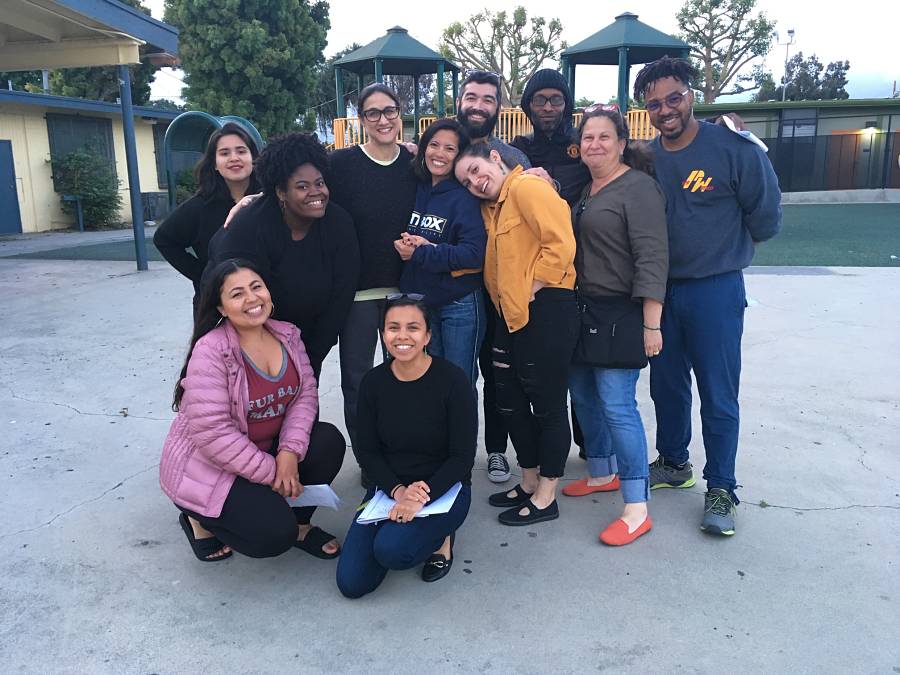Stop me if you’ve heard this one before: A city demolishes a notoriously neglected public-housing project where some of its poorest residents live so it can build in its stead a “vibrant urban village” complete with new apartments, retail, restaurants, and parks. You almost don’t have to say the words “gentrification” or “displacement” to know how this story ends.
In A Jordan Downs Illumination, a new Cornerstone Theater Company production (running May 17-26 at the Jordan Downs Recreation Center in Watts), the narrative is more complicated—not only because Los Angeles city officials have striven to mitigate the inevitable disruption caused by this redevelopment effort by offering current Jordan Downs residents spots in the new apartments with no rise in rent (while at the same failing or fudging efforts to clean up toxins in the soil). It’s also because playwright/director Nancy Keystone and producer Bruce Lemon Jr. are approaching the changes in the neighborhood more from celebratory and commemorative angles than cautionary or critical ones.
“There’s been so much written about Watts that’s been negative,” noted Keystone, who with her Critical Mass Performance Group has devised several stylized excavations of history and culture. “We’re trying to be a little bit of an antidote to that, without trying to whitewash any of it.”
Said Lemon, who grew up in Watts and has returned home after a decade working at Juilliard, Off-Broadway, and in Hollywood, “A lot of history here has been buried by the headlines of violence, of gangs and riots and drugs. But if you were to poll the community about what stories should be told, they would tell you that there are beautiful days where everything is great and everyone is happy. When all you hear from outside is negativity, that has an effect. We want to push in the other direction.”

Keystone described the show as a “modular thing,” with three main stations audiences can visit, each with a program around 20 minutes in length. One is a “Hall of Decades,” a sort of town fair with booths featuring performers with monologues recounting tales from various points in time since the project’s beginnings in the 1940s. Another segment of the show, developed with USC game expert Sam Roberts, casts theatregoers as city officials tasked with relocating Jordan Downs residents. Though there will be a sense of play in this portion (“We don’t want to call it a game, because then people will expect a prize,” Keystone quipped), it nevertheless presents a “Kafka-esque situation” because, no matter how good one’s intentions, such an exercise can be as dehumanizing as it is maddening.
The third installment features Marcenus “M.C.” Earl, a longtime Watts resident whose daughter lives at Jordan Downs, offering a “kind of tour from his perspective” of the neighborhood as it once was. One stop on that tour: a place the creators are calling “the ghost unit—a scale model of a one-bedroom unit from the old projects. It’s a meditative space where you’ll hear audio from interviews with residents like voices coming from the walls.”
This isn’t Earl’s first Cornerstone production, nor is it the peripatetic company’s first venture into Watts. One of the troupe’s first large-scale initiatives after relocating to Los Angeles in the early 1990s was a two-year Watts residency, during which Earl appeared in the plays Breaking Plates and Love of a Nightingale. Cornerstone’s work in the neighborhood helped inspire the founding of the Watts Village Theatre Company, whose leadership Lemon has taken over (under the more open-ended name Watts Village).
Though Lemon was too young to have been part of Cornerstone’s earlier efforts in Watts, he’s now an associate artistic director with the company, and he’s seeing firsthand the value of theatre for, about, and in his community.
“I left for 10 years for college, and I came back in hopes to get involved, and to try to do some stuff that my grandma can see,” said Lemon. Art, especially theatre, is necessarily local. “It needs to happen here or it’s never going to become a part of the culture or the community, and it’s never going to be something that young people think they can do. If they have to take a bus to see it, it’s not going to take root.”
Indeed A Jordan Downs Illumination may already have reached its most important constituents well before opening.
“I’ve seen more kids playing outside during our rehearsals than I have outside any school campus for years,” Lemon marveled. “All these kids next door have been watching us audition and rehearse; they get to see artists in their community connecting with them.”
Lemon mentions one young company member, Ashley Arana, who, though she has a “practical plan” to study nursing, has discovered that she also “wants to write and be involved in the theatre.” Lemon has watched her as she’s sparked to the “wild, shifting process of creating something brand new that means something to her because it’s about her home. What’s she going to do with this? That’s what I’m excited about.”


